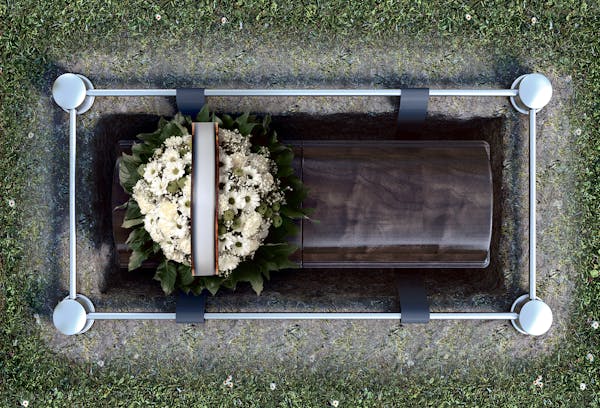Timothy Flanigan ran the crematorium at Minneapolis' Lakewood Cemetery for years. He discovered that medical debris left after cremations — rife with valuable metals — could fetch cash in the recycling market. He netted $306,500 in such sales from 2016 to 2021.
Flanigan said he considered torched titanium joints and the like as trash, and Lakewood had no formal policy for its disposal.
But Lakewood regarded it as stolen property. The Hennepin County Attorney's Office agreed, and Flanigan is set to stand trial on theft by swindle charges in February.
The odd case sheds light on an obscure and growing part of the so-called death care industry: the recycling market for "noncombustible" metals.
Cremation has become increasingly popular — nearly 60% of Americans who died in 2022 were cremated, up from 34% in 2007, according to the Cremation Association of North America. At nearly 70%, Minnesota has the highest cremation rate in the Midwest.
And there's no shortage of medical solutions for the living that involve metal implants. From gold and palladium dental work to cobalt knees, all that metal has value.
Cash-for-gold storefronts have even started to reach out to crematoriums, said Barbara Kemmis, executive director of the cremation association.
"Recycling has been commonplace in the last decade and has increased in popularity," she said.
Crematoria most often give recycling proceeds to charity, industry executives say. However, companies can keep the cash. And a smattering of people request — and receive — the medical metal of their cremated loved ones.
Supplemental income
Some large funeral homes own their own crematoria. But smaller ones rely on wholesale cremators like Lakewood Cemetery, the landmark graveyard just east of Bde Maka Ska.
Flanigan began working at Lakewood in 1984. He ran its crematorium for several years until retiring in 2021 and moving to Texas.
Crematoria run ashes past magnets and through sieves to remove metal or other nonorganic material. At Lakewood, this waste was long tossed into a dumpster, along with trash from the cemetery grounds, such as leaves, dead grass and garbage left by visitors, Flanigan said in a court filing.
In 2010, Flanigan met a Twin Cities orthopedic doctor who collected post-cremation cobalt alloy, which is used to make artificial human joints, the filing said. The doctor took the refuse to a recycler and then donated the proceeds to charity.
Flanigan claims the doctor tried contacting Lakewood directly about recyclable metals but never heard back. So Flanigan said he started setting aside metal the doctor wanted.
Around 2016, Flanigan realized the metal that the doctor did not want also had value, so he began setting that aside, too. He sold it to metal refiners "and spent the money as supplemental income," the filing said.
The County Attorney's Office says Flanigan received $306,500 from nearly 40 sales to metal refiners over five years — money that it says should have gone to charity.
Lakewood, a nonprofit, said in a civil court filing that it didn't uncover Flanigan's sales of its "stolen property" until after he retired.
That discovery came when one of the recyclers that Flanigan had used asked the cemetery how to contact him for a payment, according to a suit by Lakewood against its insurer. Lakewood claims the insurer refused to cover its employee theft claim.
No policy, no crime?
Lakewood also went to Minneapolis police.
"Our former employee deliberately defrauded our association over a period of years and in so doing deprived several charitable beneficiaries of funding," the cemetery said in a statement to the Star Tribune.
According to a filing by the County Attorney's Office, one of Lakewood's supervisors confronted Flanigan about a check they had received from a metal recycler in 2017 or 2018.
Flanigan told the supervisor that proceeds from the check would go to charity, the filing said.
In an interview, Flanigan's attorney Timothy Matuszak said the check was from a recycler and made out to a charity working with the orthopedic doctor. (Flanigan could not be reached for comment.)
After finding the check, the cemetery supervisor said any further sales proceeds should go to charity and that Lakewood itself must be the donor, the County Attorney's Office said in a filing.
Flanigan said in a filing that Lakewood had no documented policy for recycling — or for donating proceeds to charity.
"The reality is that after Mr. Flanigan retired, Lakewood inadvertently became aware of the sums of money involved in recycling the nonorganic remains of cremated bodies," his attorney wrote in a court filing. "They are upset that they did not get the money and that Mr. Flanigan did instead."
Flanigan asked that charges be dismissed for lack of probable cause, noting that taking trash is not illegal.
Ruling against Flanigan in November, Hennepin County District Judge Marta Chou wrote that the items he sold "never made it into a trash bin, which would have been publicly accessible."
Chou also wrote that "multiple people were told by the defendant that he would receive the money from the metal and then donate it charity."
Matuszak denied his client ever told anyone that money from recycling sales for his benefit was going to charity.
Laws and contracts
Since discovering Flanigan's sales, Lakewood has adopted a formal policy on recycling, cemetery spokesman Jon Austin said. Lakewood donates recycling income to charitable organizations that serve people who have experienced tragic losses, he said.
Other Twin Cities crematoria operators say they have donated recycling proceeds to charities for years. At Crescent Tide Cremation Services in St. Paul, owner Verlin Stoll said he makes most of his donations to a nearby nonprofit hospice that offers its services to the dying for free.
Paul Maher, whose Cremation & Trade Service is in the same sprawling building as Stoll's crematorium, said he donates recycling proceeds to a charitable orthopedic surgery group, as well as to a small private school and a dog rescue operation; both are in St. Paul.
Maher has been in the wholesale cremation business for about 20 years.
"For six or seven years, I just tossed it in the trash," he said of items left after cremation. "Technically, it is trash."
But then he saw how much the metal was worth;he now sends the debris to a refiner in Philadelphia. The refiner pays the freight costs.
When a family authorizes a cremation, it signs an agreement with Maher's company authorizing it to dispose of any noncombustible waste. State law requires such agreements.
Crematoria are allowed to dispose of "noncombustible materials" in "any lawful manner," the law says. It doesn't get into the details of disposal.
The state Department of Health, which regulates crematoria and funeral homes, said "it is assumed that a lawful manner would also mean in a respectful and ethical manner."
Minnesota's med spa industry rises in popularity — and with little regulation

Ramstad: Readers say Walmart won't be paying the ultimate price of Trump's tariffs

How Minnesota businesses can spot and prevent invoice fraud
No place for cryptocurrency in retirement portfolios


